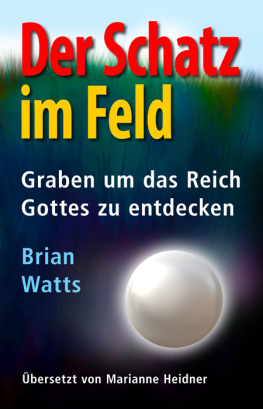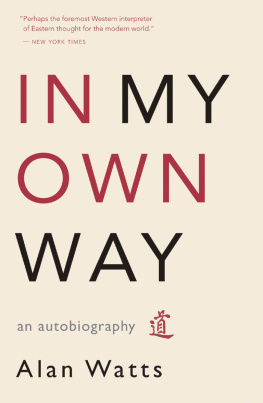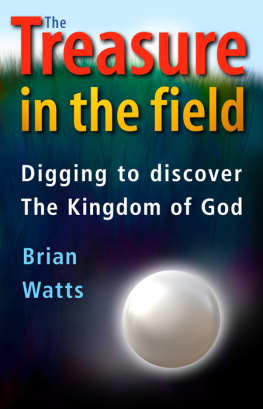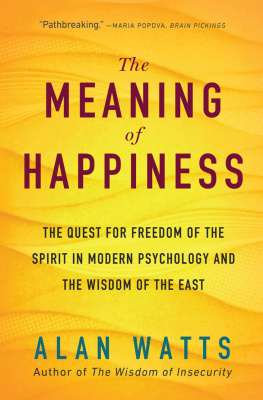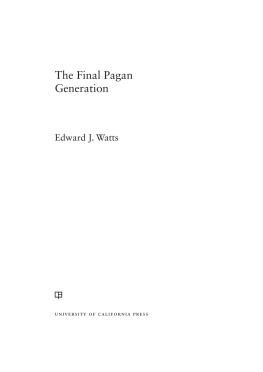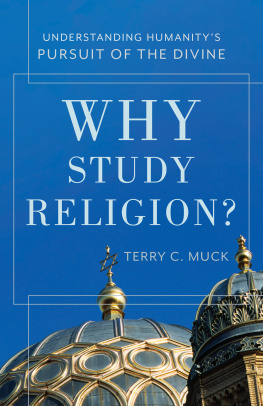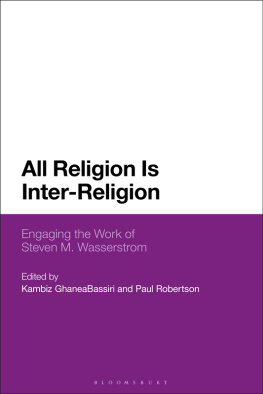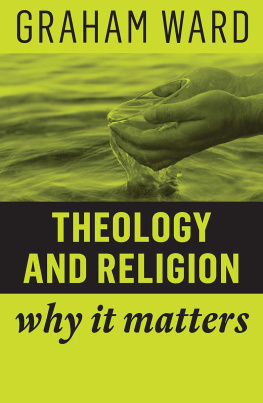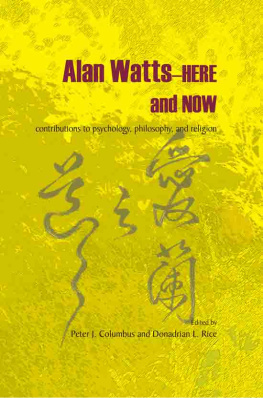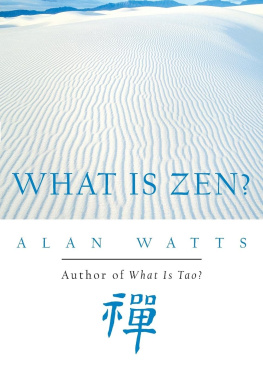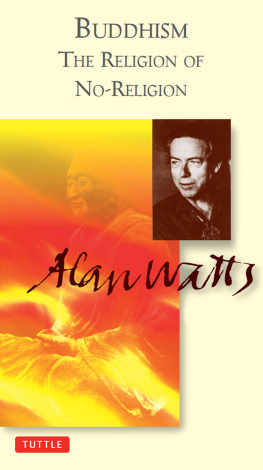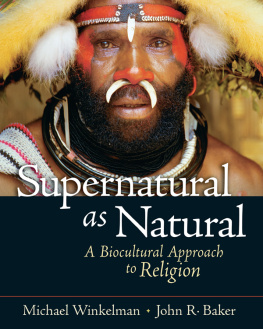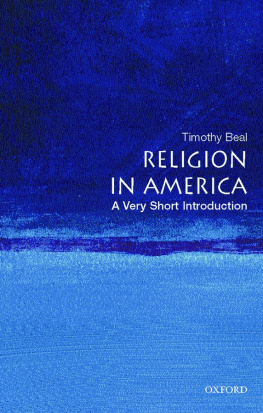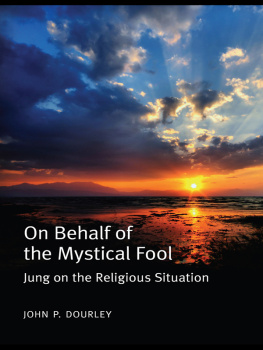Watts - Behold the spirit: a study in the necessity of mystical religion
Here you can read online Watts - Behold the spirit: a study in the necessity of mystical religion full text of the book (entire story) in english for free. Download pdf and epub, get meaning, cover and reviews about this ebook. City: New York, year: 2011;1971, publisher: Knopf Doubleday Publishing Group;Vintage Books, genre: Religion. Description of the work, (preface) as well as reviews are available. Best literature library LitArk.com created for fans of good reading and offers a wide selection of genres:
Romance novel
Science fiction
Adventure
Detective
Science
History
Home and family
Prose
Art
Politics
Computer
Non-fiction
Religion
Business
Children
Humor
Choose a favorite category and find really read worthwhile books. Enjoy immersion in the world of imagination, feel the emotions of the characters or learn something new for yourself, make an fascinating discovery.

Behold the spirit: a study in the necessity of mystical religion: summary, description and annotation
We offer to read an annotation, description, summary or preface (depends on what the author of the book "Behold the spirit: a study in the necessity of mystical religion" wrote himself). If you haven't found the necessary information about the book — write in the comments, we will try to find it.
Watts: author's other books
Who wrote Behold the spirit: a study in the necessity of mystical religion? Find out the surname, the name of the author of the book and a list of all author's works by series.
Behold the spirit: a study in the necessity of mystical religion — read online for free the complete book (whole text) full work
Below is the text of the book, divided by pages. System saving the place of the last page read, allows you to conveniently read the book "Behold the spirit: a study in the necessity of mystical religion" online for free, without having to search again every time where you left off. Put a bookmark, and you can go to the page where you finished reading at any time.
Font size:
Interval:
Bookmark:
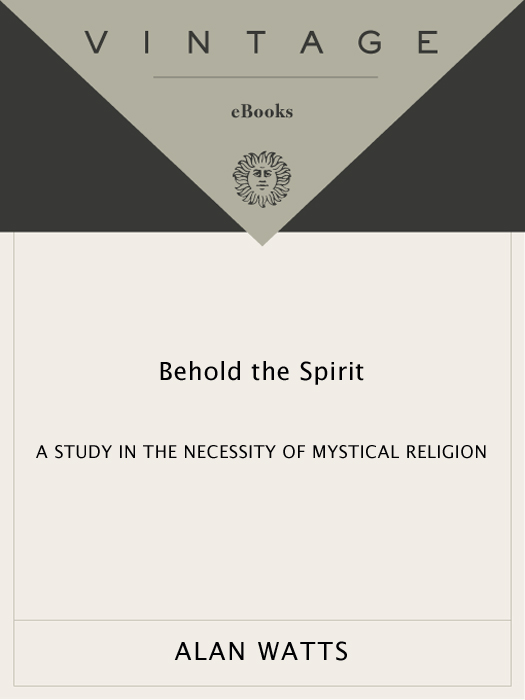
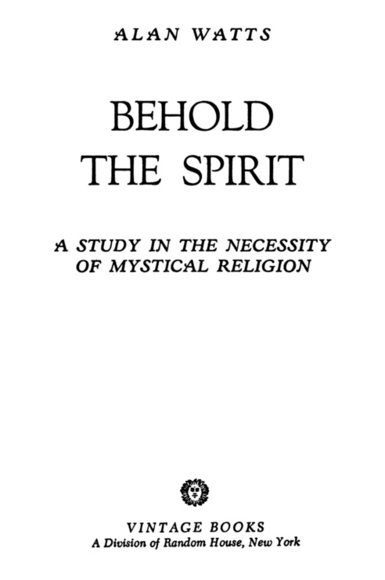
Copyright 1947, 1971 by Random House, Inc.
All rights reserved under International and Pan-American Copyright Conventions. Published in the United States by Random House, Inc., New York, and simultaneously in Canada by Random House of Canada Limited, Toronto. Originally published by Pantheon Books, a division of Random House, Inc., New York.
eISBN: 978-0-307-78433-9
Library of Congress Catalog Card Number: 79-162581
v3.1
TO MY FATHER AND MOTHER
I am greatly indebted to the following publishing houses for their kind permission to make some substantial quotations from certain authors: to Messrs. Charles Scribners Sons, of New York, and Geoffrey Bles, of London, publishers of the works of Nicolas Berdyaev; to Messrs. Sheed and Ward, publishers of Mr. E. I. Watkins Catholic Art and Culture; and to Messrs. Harper and Brothers, publishers of Mr. Raymond Blakneys Meister Eckhart.
This book was written twenty-five years ago, during the experiment of trying to immerse myself in Christianityto the extent of being a priest of the Anglican Communion, Episcopal Chaplain at Northwestern University, and an examining chaplain for candidates for holy orders in the Diocese of Chicago. Prior to this experiment, indeed since the age of fifteen, my outlook had been Buddhist rather than Christian even though I had been schooled in the heart of the Church of England and had learned a version of Christianity which was not that of this book. In adolescence I had rejected it, but as time went on the study of comparative religion and Christian mysticism suggested a way in which I might operate through the forms and in the terms of the official religion of Western culture. I did not want to be an eccentric outsider, and felt that Catholic Christianity might be taught and practised as a form of that perennial philosophy which is the gold within the sectarian dross of every great religion.
I still believe that this experiment had validity, and I have consented to the republication of Behold the Spirit with the thought that it may prove useful to the many Catholic and Protestant theologians who are now revolutionary enough to understand it. For it speaks to their condition in their own languagemore so, perhaps, than my later theological essays, The Supreme Identity (1950), Myth and Ritual in Christianity (1953), and Beyond Theology (1964), which last represents my present way of thinking within this context.
Even twenty-five years ago this experiment had some success. I did not pursue it for the purely personal reason that my bohemian style of life did not fit well with the clerical stereotype, and because even then I was ill at ease with the commitment to spiritual imperialism which most Christians feel to be the sine qua non of being Christian, as if one could not be a true Christian without being a militant missionary. But then, and more than ever today, there were both clergy and laity who hungered for a mystical approach to Christianity, concerned with the non-verbal spiritual experience of the divine rather than mere doctrine and precept. Yet now, as then, the Church is still overwhelmingly didactic and verbose, both as it faces God and as it faces the world. Its liturgies consist almost entirely of telling God what to do and the people how to behave. By rationalizing the Mass and celebrating it in the vernacular instead of Latin, even the Roman Church has made the liturgy an occasion for filling ones head with thoughts, aspirations, considerations and resolutions, so that it is almost impossible to use the Mass as a support for pure contemplation, free from discursive chatter in the skull.
Today, the idea of the mystical finds greater acceptance, both within and outside the Church, than in 1946. A vast and well-informed literature on the subject has made it clear that mysticism is not a collective term for such spookeries as levitation, astrology, telekinesis, and projection of the astral body. Theologians can no longer dismiss or distort the mystical teachings of either East or West without revealing plain lack of scholarship. Scientistsnow familiar with field theory, ecological dynamics and the transactional nature of perceptioncan no longer see man as the independent observer of an alien and rigidly mechanical world of separate objects. The clearly mystical sensation of self-and-universe, or organism-and-environment, as a unified field or process seems to fit the facts. The sensation of man as an island-ego in a hostile, stupid or indifferent universe seems more of a dangerous hallucination.
At the same time it is less and less plausible to conceive God in the thought-graven image of a transcendental monarch modelled on the Pharaohs and Cyruses. But the dissolution of this idol need not leave us with no other alternative than the insipid humanism suggested by death of God and religionless Christianity theologians. The God of mystical experience may not be the ethically obstreperous and precisely defined autocrat beloved of religious authoritarians; but as an experience, not concept, as vividly real as indefinable, this God does not violate the intellectual conscience, the aesthetic imagination, or the religious intuition. A Christianity which is not basically mystical must become either a political ideology or a mindless fundamentalism. This is, indeed, already happening, and it is curious to note that, for lack of the mystical element, both trends fall back on the Bible as their basic inspirationand it has always struck me that Biblical idolatry is one of the most depressing and sterile fixations of the religious mind.
We now know beyond doubt that large and widely scattered numbers of otherwise sane and sober people have had experiences of cosmic consciousness in which the sense of life becomes perfectly clear. The antagonisms of good and evil, life and death, being and nothing, self and other are felt as the poles or undulations of a single, eternal and harmonious energyexuding a sense of joy and love. The feeling may be purely subjective and without reference to external reality (as if external could be independent of internal), but it comes upon us with the same startling independence of wishing and willing as a flash of lightning. Debates as to whether this vision is or is not true seem as pointless as asking whether my sensation of green is just the same as yours. But the vision is not pointless because, when seen, it is obviously the whole point of life and, often enough, it transforms ones way of living.
In our inevitably clumsy attempts to describe this vision it often seems necessary to say that everything is God, that God alone is real, that a crumb is the whole universe, or that you and God are one. At the same time, the experience is somehow a grace: it is given and cannot be evoked by effort of will. In Behold the Spirit I was trying to show that the gift of the Incarnation, of God becoming man (virgin-born, without human effort), implied and fulfilled itself in this experience, and in this sense I quoted the saying of St. Athanasius that God became man that man might become God. But I was pussyfooting, as is always the way with theologians when they try to discuss the Christology of ordinary human beings as distinct from the Christology of Jesus. For the Churchs habitual assumption, having the force of dogma, is that Jesus of Nazareth was and is the only son of woman who was at the same time God. This Godhood is extended to other people by participation in the human nature of Jesus, explained by the tortuous Greek notion that human nature is a real universal or substance in which we all share. When the
Font size:
Interval:
Bookmark:
Similar books «Behold the spirit: a study in the necessity of mystical religion»
Look at similar books to Behold the spirit: a study in the necessity of mystical religion. We have selected literature similar in name and meaning in the hope of providing readers with more options to find new, interesting, not yet read works.
Discussion, reviews of the book Behold the spirit: a study in the necessity of mystical religion and just readers' own opinions. Leave your comments, write what you think about the work, its meaning or the main characters. Specify what exactly you liked and what you didn't like, and why you think so.

